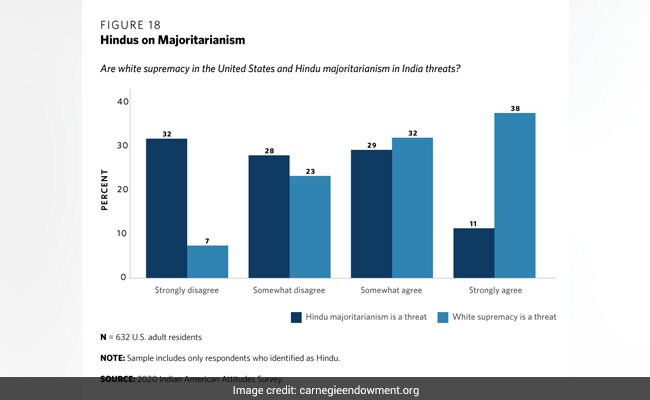
Indian-Americans hold "relatively more conservative" views on Indian policies - such as those affecting protection of religious minorities, immigration and affirmative active - than American ones, according to a report based on a survey of the community in September last year.
The report - a collaboration between the Carnegie Endowment for International Peace, Johns Hopkins-SAIS, and the University of Pennsylvania - draws on data from an online survey of 1,200 adult Indian Americans. The survey has an overall margin of error of +/- 2.8 per cent.
As an example, 90 per cent of respondents supported treating members of all faiths equally. Of these, 60 per cent expressed opposition to the 'Muslim travel ban' imposed by Donald Trump but only 49 per cent opposed the Indian government's controversial citizenship law (CAA).
Similarly, 69 per cent supported more the idea of liberal immigration policies. However, only 45 per cent indicated they were opposed to the equally controversial all-India NRC exercise proposed by the Indian government. 55 per cent supported less stringent policies in the United States.

To questions on ethnic majoritarianism, 53 per cent see Hindu majoritarianism as a threat to minorities in India. However, 73 per cent view white supremacy as a similar threat in the US.

"Indian Americans... believe white supremacy is a greater threat to minorities in the US, a country where they are a minority, than Hindu majoritarianism is to minorities in India, a country where Hindus (the most common faith of Indian Americans) are in the majority," the report says.
Analysing that response - by religious faith is "instructive" the report adds, pointing out that while 70 per cent of Hindus and (79 per cent of non-Hindus) see white supremacy as a threat, only 40 per cent see Hindu majoritarianism as a similar threat, compared to 67 per cent of non-Hindus.
The survey also asked respondents for the top three challenges India faces today.
Government corruption topped that list with 18 per cent of responses, with the condition of the economy narrowly behind at 15 per cent. Religious majoritarianism was third with 10 per cent.

Indian-Americans are also divided about US action to strengthen India's military as a check against China - which only seven per cent of respondents see as the top challenge facing the Narendra Modi government today. Only 53 per cent of foreign-born respondents and 38 per cent of US-born respondents supported that move, with the rest either in disagreement or expressing no opinion.

The division over support for the US strengthening India's military also plays out politically - 69 per cent of Indian-Americans who identify as Republican support this, as compared to only 41 per cent of Democrats; they are also more likely to say they do not want the US to provoke China.
In terms of overall support, 40 per cent believe the current relationship is "just right", while 12 per cent believe the US is "too supportive". 24 per cent believe the US is "not supportive enough".

It also shows that nearly 50 per cent of all Indian-Americans approve (35 per cent "strongly approve") of Prime Minister Narendra Modi's performance, with support unsurprisingly greatest among those who come from states where the ruling BJP is dominant - such as Gujarat - and identify themselves as Hindu and Republican.

Consequently, the data shows a heavy tilt towards the BJP as the preferred choice, with 32 per cent of respondents picking the Prime Minister's party and only 12 opting for the Congress.
A significant portion of the Prime Minister's approval rating comes from those between 30 and 49 years old (53 per cent) and those over 50 (55 per cent), with 43 per cent of those between 18 and 29 disapproving of him as against only 35 per cent who approved.
The report flags a three-fold difference between net approval ratings in the US and in India - a 19 per cent rating in favour of the Prime Minister in the US compared to 55 per cent in India.
Late Monday night Prime Minister Modi tweeted that he had spoken to new US President Joe Biden to discuss regional issues and "our shared priorities" and express commitment to a "rule-based international order".
Track Latest News Live on NDTV.com and get news updates from India and around the world

